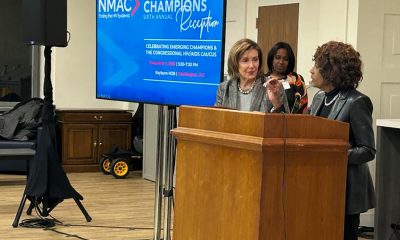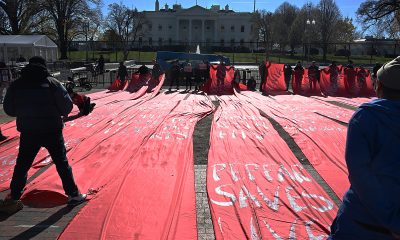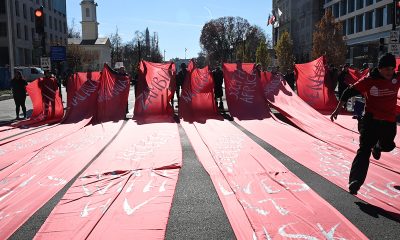National
Catholic Charities USA’s gay lobbyist
Sheridan Group paid nearly $500K for anti-poverty work
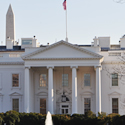
Catholic Charities USA, the nation’s largest network of faith-based agencies providing services to the poor, has hired a Washington lobbying firm owned by a gay man to promote a recently launched anti-poverty initiative before Congress and the Obama administration.
In a little noticed development, Catholic Charities USA retained the Sheridan Group, founded in 1991 by social worker and gay rights advocate Tom Sheridan, to coordinate the development of legislation and related advocacy programs aimed at “starting a new national conversation on poverty and opportunity.”
Lobbying disclosure reports filed with the House and Senate show that Catholic Charities USA paid the Sheridan Group $476,750 between April 2010 and April 2011 for lobbying services and advocacy work related to the Catholic organization’s anti-poverty projects.
News of the Sheridan Group’s lobbying work for Catholic Charities USA comes at a time when local Catholic Charities agencies — including those in D.C., Massachusetts, and Illinois — have withdrawn from providing adoption services for state or local governments rather than be forced to provide such services to same-sex couples.
Catholic Charities of the Archdiocese of Washington spoke out against a same-sex marriage law at the time the D.C. City Council deliberated over the measure.
Executive Director Edward Orzechowski announced shortly after the D.C. Council passed the same-sex marriage law in December 2009 that Catholic Charities of Washington would discontinue providing adoption services in D.C. rather than be forced to facilitate adoptions by gay and lesbian couples.
Orzechowski also announced that his organization would no longer offer health insurance benefits to the spouses of its employees to avoid having to offer such benefits to same-sex partners.
“This allows us to continue providing services, comply with the city’s new requirements and remain faithful to our church’s teachings,” he said at the time.
Sheridan points out that Catholic Charities USA, while serving as a trade association that represents as many as 165 local Catholic Charities agencies linked to the Catholic Church, is independent from the local agencies, including those that have voiced opposition to same-sex marriage.
“They’re only together as service providers on poverty issues, which is why I have no problem representing them,” Sheridan said of Catholic Charities USA. “And I’m proud to represent them because they do such outstanding work.”
Sheridan said he began his career as a social worker. As a gay Catholic interested in social justice causes, he said he has long admired the dedicated social services work Catholic Charities groups have performed throughout the country.
Prior to founding the Sheridan Group, Sheridan worked as a lobbyist in the early 1980s for the AIDS Action Council, one of the nation’s first national advocacy organizations for people with AIDS. In subsequent years, he said the Sheridan Group has represented a number of AIDS advocacy organizations as well as other non-profit, social justice oriented groups as clients.
Sister Jeannine Gramick, a Catholic nun and one of the founders of New Ways Ministry, which provides support for LGBT Catholics, said Catholic Charities USA and some local Catholic Charities agencies have provided behind-the-scenes support for the LGBT Catholic community.
“Catholic Charities in general have been the most progressive wing of the church other than the nuns,” she said. “In some cases, Catholic Charities USA has supported our events. I feel they personally are pro-gay but they can’t do this publicly.”
Francis DeBernardo, New Ways Ministry’s executive director, said Catholic Charities agencies on the local level shouldn’t be viewed as adversaries to the LGBT community.
“I feel the homophobia is there,” he said. “But that is due mostly to the bishops, who have an immense amount of power over Catholic Charities” on the local level.
When asked to comment on its decision to retain a lobbying firm owned by an openly gay man, Catholic Charities USA issued a written statement to the Blade from its president, Rev. Larry Snyder, a Roman Catholic priest.
Snyder said Catholic Charities USA has utilized the “strategic leadership of the Sheridan Group” to launch its centennial project that “incorporates policy development as well as legislative, communications, grassroots and fundraising efforts” to prevent and alleviate poverty over the next 100 years.
“We have been pleased with the success of this project to date and will continue to work with a bipartisan team of consultants on this campaign as we see our work grow in importance and urgency every day,” he said.
Among Sheridan and his firm’s key duties for Catholic Charities USA was the drafting of a bill called the National Opportunity and Community Renewal Act. Catholic Charities USA officials say they hope the bill, if approved by Congress, will serve as a catalyst for innovative new programs aimed at eradicating poverty in America in 10 years.
Sheridan said some of the money his firm received from Catholic Charities USA has gone to subcontractors that he hired in his role as “general contractor” on behalf of the anti-poverty initiative. The objective, he said, is to put together a bipartisan coalition of lawmakers and community leaders to sign on to the legislation.
Although the bill has not attracted much support in Congress so far, Sheridan said its introduction last year was linked to Catholic Charities USA’s 100th anniversary and the group’s special centennial celebration.
Sen. Bob Casey (D-Pa.) introduced the National Opportunity and Community Renewal Act in the Senate last year with no other senator signing on as a co-sponsor. Rep. James McGovern (D-Mass.) introduced the bill in the House, with just three co-sponsors signing on – all Democrats.
One congressional staffer, who spoke on condition of not being identified, said bills attracting so few co-sponsors usually have little or no chance of passing.
But Sheridan said he will be working closely with Catholic Charities USA and its allies and supporters over the next several months to build a broad-based, bipartisan coalition that he expects will prompt a sizable number of lawmakers to co-sponsor the bill.
Among other things, the bill would provide $100 million for 10 separate grants to fund anti-poverty demonstration projects on the state and local level.
National
Lawmakers warn of HIV crisis as federal support collapses
NMAC hosted Capitol Hill event on Wednesday
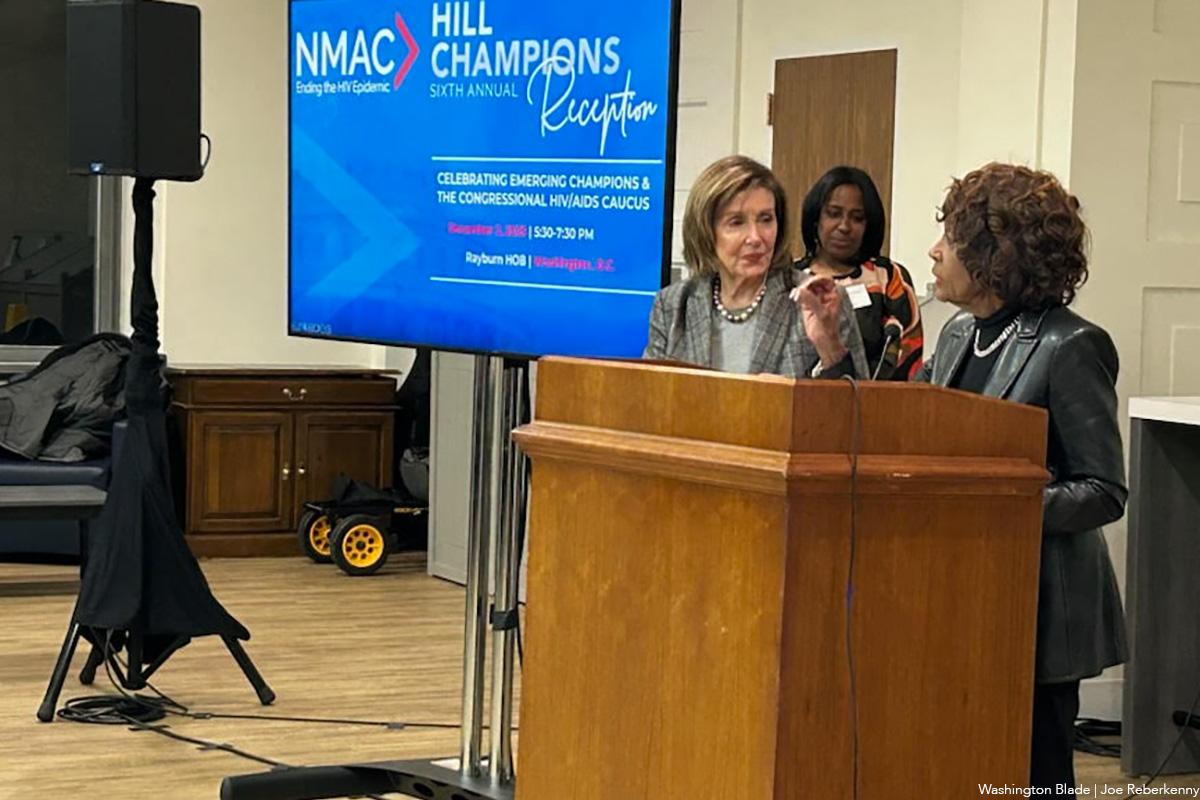
NMAC, formerly known as the National Minority AIDS Council, a nonprofit organization that works for health equity and racial justice to end the HIV epidemic, held its 6th annual Hill Champions reception on Wednesday in the Rayburn House Office Building to honor federal legislators who have worked to stop the spread of HIV/AIDS in the U.S. and around the world.
Currently there are an estimated 40.8 million people worldwide living with HIV, with about 1.2 million people in the U.S. with the disease. While there is no cure, there are highly effective treatments that can control the virus and allow people to live long, healthy lives called antiretroviral therapy that can reduce the amount of virus in the body to an undetectable level, which also prevents the spread of HIV to others.
This year, NMAC’s reception featured a slew of current policymakers who use their national platforms to push for expanding HIV funding in Congress. This year’s honorees were three congresswomen who are active voices for HIV/AIDS on the House floor: U.S. Reps. Jasmine Crockett (D-Texas), Sara Jacobs (D-Calif.), and Delia Ramirez (D-Ill.).
The awards presented to the representatives are named after three congressional icons who have dedicated their lives to ensuring the voices of the most marginalized are heard, seen, and helped.
Crockett received the John Lewis Good Trouble Award, Jacobs received the Barbara Lee Courage in HIV/Advocacy Award, and Ramirez received the Elijah Cummings Award for Minority Health Equity.
NMAC CEO Harold J. Phillips, the former director of the White House Office of National AIDS Policy under President Joe Biden, was one of the first to speak at the event. He congratulated the honorees, highlighted work accomplished this past year in the fight against HIV/AIDS, and outlined what lies ahead as the current president continues to slash funding for public health initiatives worldwide.
“Tonight, we gather to celebrate what’s possible when courage meets commitment, when leaders refuse to let politics stand in the way of saving lives, we’re in a critical moment. Political uncertainty threatens the very programs that have transformed HIV into a manageable condition, but a crisis creates an opportunity for collective action,” Phillips said. “For more than 40 years, the HIV movement has thrived because of bipartisan leadership, leaders who understood that public health transcends party lines. Now more than ever, we need advocates on the hill.”
He continued, spotlighting actions taken by the honorees for the HIV movement during a time when some of the highest officials in government refuse to acknowledge it.
“What unites these champions is their understanding that HIV advocacy is not political — it is moral. They show us what it looks like when leaders treat public health as a responsibility, not a bargaining chip.”
Jacobs and Ramirez attended in person, while Crockett, who was unable to be there, sent a video.
In her speech after receiving the Barbara Lee Courage in HIV/Advocacy Award, Jacobs emphasized that the policies and initiatives put forward through the HIV Caucus and public health organizations in the U.S. have global impact — particularly regarding PEPFAR. Jacobs has been a consistent champion for people living with HIV, military service rights, and protecting the U.S. Agency for International Development.
“PEPFAR has saved over 25 million lives, but cuts are already causing catastrophic setbacks,” Rep. Jacobs said, explaining that even with progress made due to PEPFAR funding, places like Malawi reaching the 95-95-95 goal (95 percent of all people with HIV knew their status, 95 percent of those diagnosed were on lifesaving antiretrovirals, and 95 percent of those on medication were unable to transmit HIV) will continue to suffer. “In Malawi, where services for LGBTQ people, sex workers, young women, and other marginalized groups have been eliminated, it’s no longer a question of if transmission rates will rise — but when. We cannot leave communities behind or allow preventable deaths because of political decisions made in Washington.”
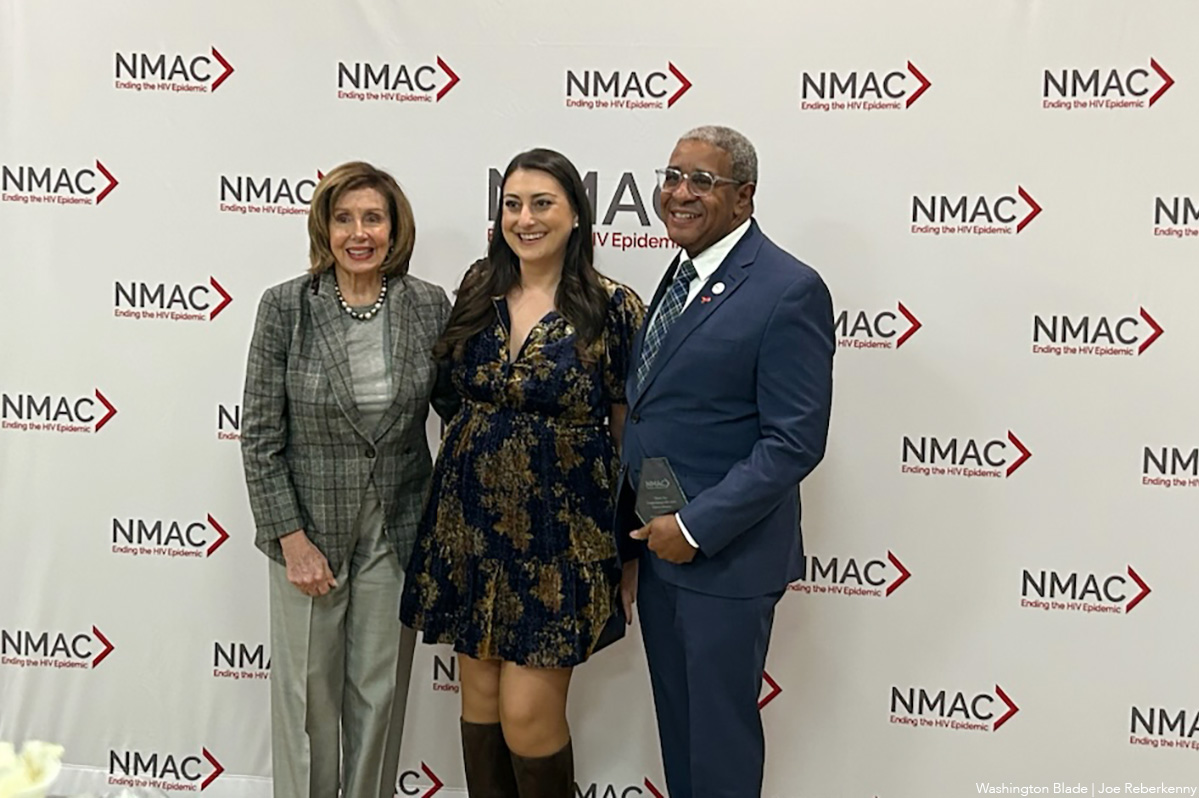
“I know that people of color, immigrants and trans people, have all been let down by our mainstream approach to HIV prevention and everything, I see seven barriers they face in accessing health care, the stigma surrounding disease and the lack of awareness from people in power,” the San Diego congresswoman said. “I want to say to those in that community, I will not let you fall through the cracks. I will not let you become another statistic, and I will keep working to make sure your voice is heard and that you can live a full and healthy life.”
Crockett, who addressed the crowd via video, emphasized her award’s namesake, explaining that the “good trouble” she gets into on the House floor and in committees can be deemed too much even by those in her own party, but that she remains committed to making HIV treatment accessible to all, regardless of background.
“To receive an award named after John Lewis is an honor all on its own. It means being bold, speaking up when others are scared to and standing firm when the truth makes people uncomfortable. And y’all know me — I don’t mind stirring a little trouble, especially when I am stirring trouble that is good trouble — but I never do it alone. I do it with the strength of the communities I represent. I do it with the stories of the folks who feel unheard. I do it for the people who depend on someone in those halls of Congress to fight for them. So this award isn’t just mine. It belongs to every advocate pushing for access to health care, every person navigating their own health journey, every organizer who refuses to give up.”
She continued, without directly calling out the White House, making allusions to pushing back against the recent emergence of budget cuts.
“I promise to keep fighting for funding, for research, for resources ,and for every community that needs a champion, because getting into good trouble isn’t just a phrase, it’s a calling, a calling we all share in this room,” Crockett said. “Thank you again for this honor, and thank you for your leadership, your fight and your refusal to back down. Now, let’s keep getting into that good trouble.”
Ramirez, who represents a part of Chicago, was previously in the Illinois House of Representatives, where she co-sponsored legislation to allow minors to access HIV and STI testing, prevention, and treatment without parental consent. She was also a chief co-sponsor in securing $10 million in state funding for this initiative in Illinois, and was the House chief co-sponsor for the “disrupting disparities for LGBTQ+ older adults and older adults living with HIV” initiative.
“I am clear more than ever that a commitment to ending the HIV and AIDS epidemic must continue to be our priority, and we must demonstrate that priority not through words, my friends, but through action — fighting for and protecting our neighbors, living with HIV or AIDS, including our LGBTQI plus neighbors,” Ramirez said. “It means showing up, telling our stories, celebrating each other and fighting side by side for that collective liberation, which only makes me more grateful for the people in this room.”
She also used the platform to criticize how some of Trump-Vance administration’s cuts to healthcare coverage funding were directed at underserved communities within the U.S. — namely undocumented immigrants like her parents.
“I want you to know that as members of Congress, we cannot go through day to day as business as usual, today is the time to demand that our siblings living with HIV and AIDS, no matter their sexual orientation, no matter their gender expression, no matter their zip code, their background or their citizenship status, that they get everything that they deserve, every Damn thing, so that they can live a healthy and thriving life.”
While the event was intended to celebrate the accomplishments of legislators, advocates, and supporters of the fight against HIV/AIDS, the tone of the night was noticeably more charged following the Trump-Vance administration’s refusal to acknowledge World AIDS Day — and the reported directive instructing federal employees not to comment about it on any channels, including social media and traditional media.
Speaker Emerita Nancy Pelosi (D-Calif.) made a surprise appearance, celebrating the three legislators while emphasizing the critical importance of supporting HIV/AIDS research now that the White House has refused to acknowledge it.
“It’s really important this year, because this is the first time in a very long time that we have had World AIDS Day when the president of the United States has said, we can’t really talk about it and we certainly should not observe it for two days. On Sunday and Monday in San Francisco, we did exactly that. We talked about it, and we observed it, and here we are talking about it here, because, as Congressman Crockett said, and we all know, we’re here to fight for funding. We’re fighting for research, prevention, and all of that, but we’re also here to fight against discrimination and stigma anybody wants to attach to this, and that starts with you in the White House,” Pelosi said. “We have a fight on our hands, because this isn’t over.. [to] make sure that any discussion of HIV ends up in the dust bin of history, an ancient malady when our children, grandchildren all grow up. ‘What was that?’ It was something that doesn’t exist anymore because of the goodness of others, because of the National Minority AIDS Council.”
Maxine Waters slams Trump
U.S. Rep. Maxine Waters (D-Calif.) also made an appearance and delivered an unfiltered, passionate speech praising NMAC’s efforts and calling out Trump for ending funding for HIV/AIDS worldwide while simultaneously accepting donations to rebuild the White House as he sees fit.
“I want to tell you when they asked, how was I doing when I came in, really, I was thinking about the president of the United States and what’s going on now, it’s so troubling. And I find myself not sleeping as well as I normally sleep. I find myself trying to believe that what I see is happening is absolutely happening,” Waters said. “Many of our people with HIV and AIDS are homeless, and they’re not being taken care of, and they’re going to die with the cuts that are being made. Unfortunately, we just got to say it.”
She continued, calling out Trump’s lack of focus on domestic issues like HIV/AIDS that directly impact American citizens, instead prioritizing issues unrelated to the public’s welfare.
“The fact that the president of the United States is killing people in international waters in Venezuela, not knowing whether or not they’re drug dealers or not, not caring, and I think about two people, two men hanging on the side of the boat who had escaped the bomb that hit, and they said, kill him, and they shot him down and killed it’s hard to live with this. It’s hard to understand how all of this is happening. And so Trump refused to commemorate World AIDS Day, and his State Department instructed employees and grantees to refrain from publicly promoting World AIDS Day through any communication channels, including social media, media engagements, speeches or other public facing messaging let’s just be an honorary Why would he be focused on us celebrating or working with World AIDS Day and helping people to understand that HIV and AIDS is still a big problem in this country, and we have to spend money. We have to do what it takes in order to provide the medicine and the health care that they need. Why would he just be against that? He’s already cutting the funds. But just go even further and say and don’t even promote World AIDS Day. It’s bothersome. Trump halted funds for PEPFAR, the President’s Emergency Plan for AIDS Relief, which was created under the leadership of former Congresswoman Barbara Lee, the co-founder of the Congressional HIV AIDS Caucus.”
“There’s a very rich man that paid attention to what was going on with HIV and AIDS, and that was Bill Gates. And I’d like to quote him and what he said. ‘We’re already seeing the tragic impact of reductions in aid, and we know the number of date deaths will continue to rise.’ Here in the United States, where Nancy and I just talked about the creation of Minority AIDS Initiative to address AIDS disparities, and where the initiative has grown from 156 million when we first started in 1999 to more than 400 million per year. Today, Donald Trump is waging an all out war on people living with HIV. Trump’s budget proposal completely eliminated HIV prevention funding at the Centers for Disease Control and Prevention, and he slashed the funds from Ryan White AIDS care and HIV research. We cannot allow, we cannot allow these devastating cuts to be implemented, and so we’re doing everything that we possibly can to fight Donald Trump on all of these issues. I want you to know that this attack on many of our friends who happened to come from other countries is just outrageous, and what he said about Somalia today just cannot be understood or accepted. And so for all of the nice people in the room, get mad, get angry. Do a little cursing. Tell people what you think about it, because if you’re too nice, nobody believes you. You got to kick a little butt. You got to make sure that they understand we’re in this fight and we’re not going to go away. I know he’s the president of the United States, but he shouldn’t be. He’s the president of the United States with a cabinet that knows nothing and cares nothing about anybody. I dare anybody to talk about minorities and want to know whether or not we’re qualified. Hell, they have the most unqualified people that you’ve ever witnessed in your life, anytime, anyplace, anywhere. We want to get rid of all of them dealing with this public policy, doing everything that we can, educating people. Don’t forget, you got to get them to vote.”
She spoke for 17 minutes, touching on many current events but repeatedly returning to the point that the president is supposed to represent the people — not his own interests.
“I came here to talk about AIDS, but I wasn’t going to let you go without talking about some other stuff too. And I’m going to leave you with saying, not only are we concerned and we’re upset about the kind of cuts that are made, whether we’re talking about health care, we’re talking about AIDS in particular, whether we’re talking about Section Eight, whether we’re talking about food stamps, this crazy man is destroying the White House — bulldozes the East Wing. Why would he do that? And why would he spend over $300 million to do that while he’s cutting all of these programs? Well, he’ll say it’s being donated. Well, get it donated to AIDS. You know what I’m saying. Why are you getting it donated? And then, last of all, which pisses me off, you. Definitely, and I just think it’s crazy and outrageous. He wants to take the John F. Kennedy Center and name it after Melania. What the hell?”
In a moment when federal silence grows louder, the advocates in that room offered a counterpoint — a reminder that community, courage, and persistence still drive the fight to end HIV.
Maine
Maine governor opens LGBTQ+ Victory Institute’s D.C. conference
Janet Mills successfully challenged White House’s anti-trans athlete executive order
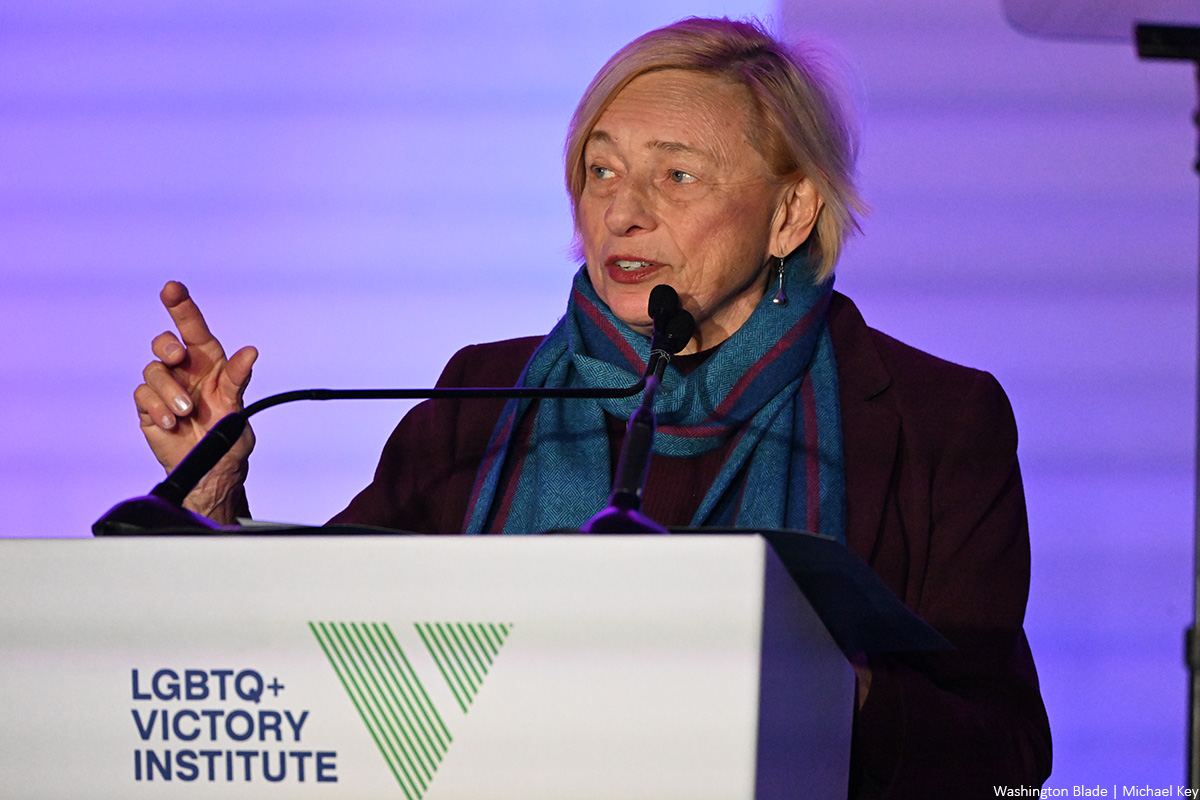
Maine Gov. Janet Mills on Thursday opened the LGBTQ+ Victory Institute’s annual International LGBTQ+ Leaders Conference in D.C.
Mills noted her February confrontation with President Donald Trump in the Oval Office over his executive order that bans transgender athletes from participating in school sports teams consistent with their gender identity.
Maine sued the Trump-Vance administration after it withheld federal funds to the state’s Department of Education. A federal judge ordered the White House to unfreeze the money.
“I speak as someone who, yeah, stood up to the president of the United States, to his face, when Donald Trump demanded that Maine violate our own laws to discriminate against transgender youth,” said Mills. “I told him I’d see him court. And guess what? We did see him in court and we won.”
Mills in October announced she is challenging incumbent U.S. Sen. Susan Collins (R-Maine).
Puerto Rico
Puerto Rico’s largest LGBTQ organization struggling amid federal funding cuts
Waves Ahead lost two grants from Justice Department, HUD
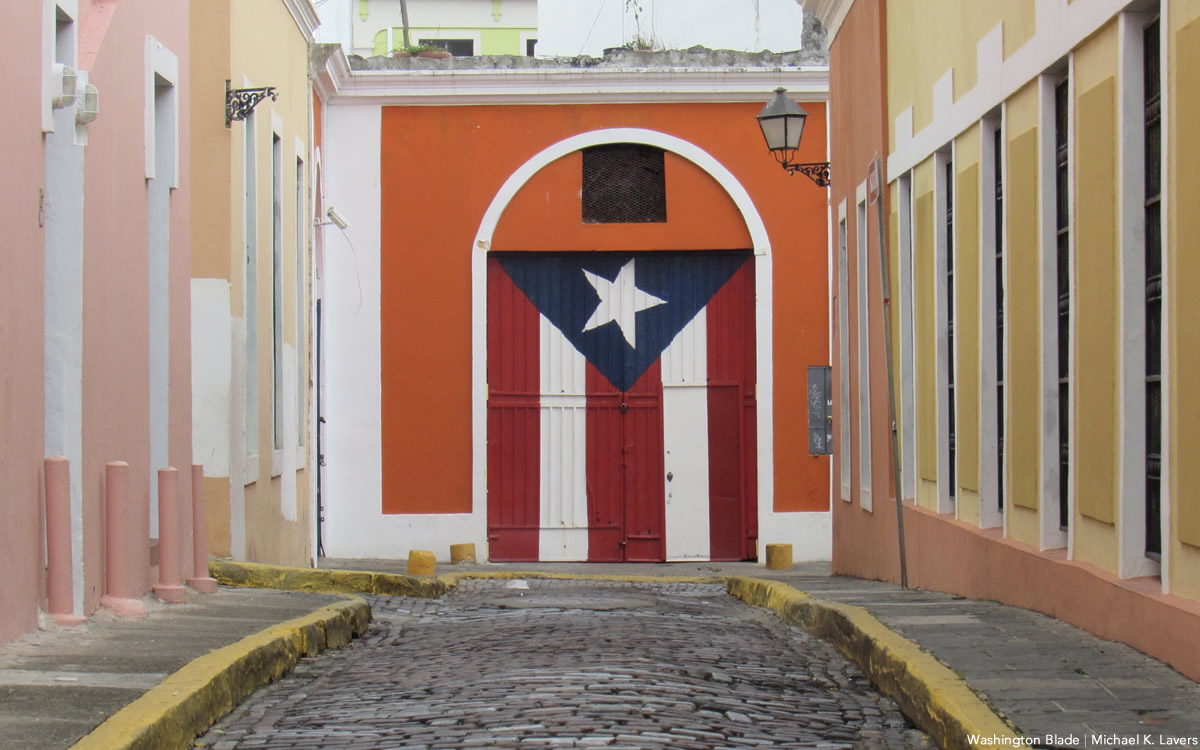
A loss of federal funds has forced Puerto Rico’s largest LGBTQ organization to scale back its work on the island.
Waves Ahead earlier this year lost upwards of $200,000 for a restorative justice program that the Justice Department funded through a three-year grant.
The U.S. Department of Housing and Urban Development has also rescinded a $170,000 annual grant that Waves Ahead used to sustain Soraya’s House, a transitional housing program for LGBTQ people in Cabo Rojo, a municipality in Puerto Rico’s southwest coast. Puerto Rico’s Women’s Advocate Office, known by the acronym OPM, earlier this year also denied Waves Ahead’s application to receive more funding for its work to combat anti-LGBTQ violence.
OPM distributes STOP (Services, Training, Officers, and Prosecutors) Violence Against Women Formula Program funds it receives from the Justice Department to grant recipients in Puerto Rico.
Waves Ahead Executive Director Wilfred Labiosa during an interview with El Nuevo Día, a Puerto Rican newspaper, last month said his organization between October 2023 and January 2025 received more than $110,000 from OPM. (The Trump-Vance administration took office on Jan. 20. Puerto Rico Gov. Jenniffer González Colón, a Republican who supports President Donald Trump, took office on Jan. 2.)
Labiosa during an interview with the Washington Blade said Waves Ahead has lost 60 percent of its total budget.
The cuts have forced Waves Ahead to close its community center in Loíza, a municipality that is roughly 20 miles east of San Juan, the Puerto Rican capital. Waves Ahead has also had to curtail its restorative justice program that it operates with the Puerto Rico Cultural Center in Chicago.
Community centers continue to operate in San Juan, Cabo Rojo, Maunabo, and Isabela.
“People were really gaining a lot of skills. People were really involved,” Labiosa told the Blade.
“That was just pulled like a big band-aid right off the skin,” he said, referring to when he learned the Justice Department had rescinded the grant.
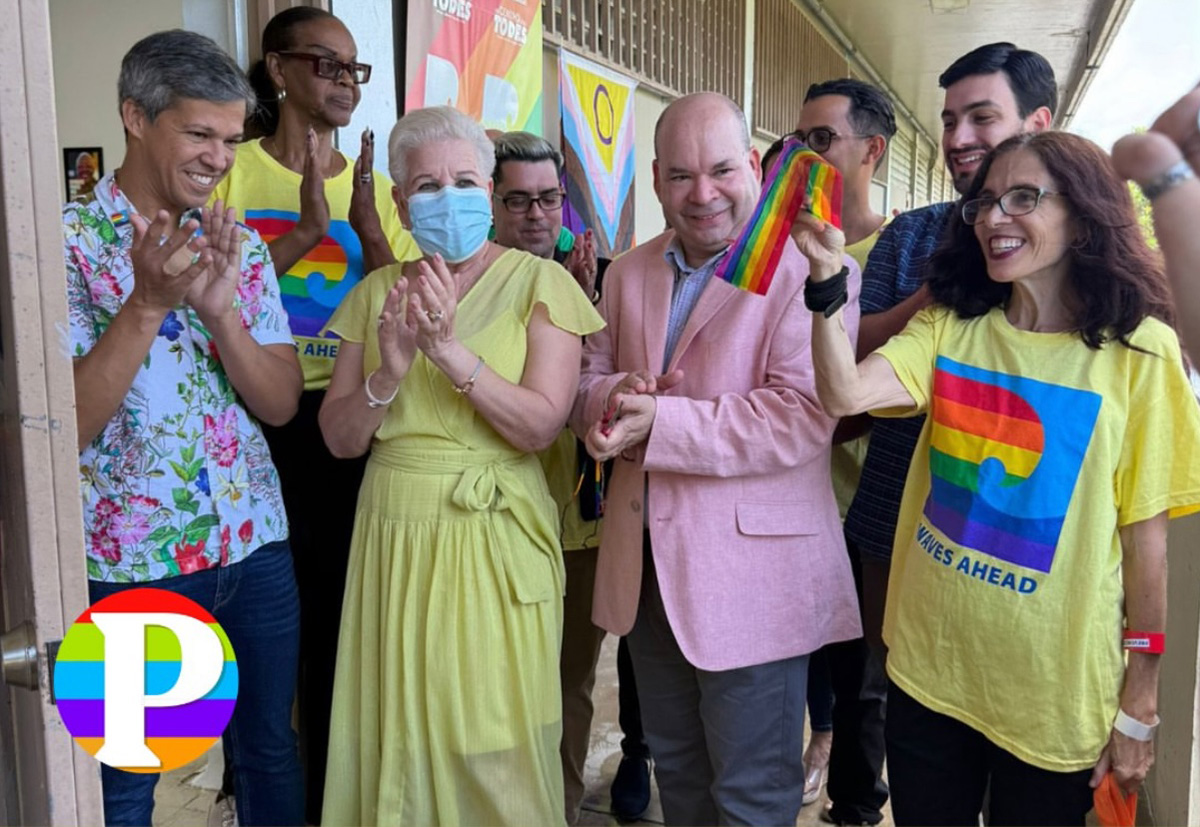
Waves Ahead Executive Director Wilfred Labiosa and volunteers bring food, water and other relief supplies to Iluminada, an 86-year-old resident of Vieques, Puerto Rico, on Jan. 31, 2018. Hurricane Maria a few months earlier devastated the U.S. commonwealth. (Washington Blade video by Michael K. Lavers)
Labiosa told the Blade the White House’s anti-LGBTQ policies and stance against diversity, equity, and inclusion programs likely contributed to the loss of federal funds.
He noted Waves Ahead lost its HUD funding, even though it was “on the list.”
“People here in Puerto Rico started to receive all the award letters, and all of a sudden we didn’t receive ours,” said Labiosa.
He told the Blade that Waves Ahead is one of two HUD grant recipients in Puerto Rico with LGBTQ-specific language in their profile, but “it is the only organization that has its mission and programming focused on LGBT homeless and people who needed transitional housing.”
“When we approached HUD and approached the local agent of HUD here … they all said, oh, we’re not sure what happened,” said Labiosa. “We tried to meet with everybody involved, but HUD never gave us a phone call. They just sent us an email saying you didn’t answer this question. The question was answered. It was something pitiful.”
Neither HUD nor the Justice Department have responded to the Blade’s request for comment.
Waves Ahead, meanwhile, has turned to the Puerto Rican diaspora in the mainland U.S. and private foundations for support. Labiosa noted local organizations and businesses have also given Waves Ahead money.
Waves Ahead on Giving Tuesday raised $2,778.
“We continue hands on and moving forward,” said Labiosa.
-

 The White House1 day ago
The White House1 day ago‘Lavender Scare 2.0’: inside the White House’s campaign against LGBTQ federal employees
-

 District of Columbia3 days ago
District of Columbia3 days agoHIV/AIDS activists block intersection near White House
-

 Movies4 days ago
Movies4 days agoHoliday movie season off to a ‘Wicked’ good start
-

 District of Columbia2 days ago
District of Columbia2 days agoActivists praise Mayor Bowser’s impact on city, LGBTQ community

